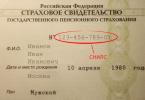For a huge number of people, obtaining Russian citizenship is a real dream. Of course, there are few Europeans among them, but there are plenty of residents of the former USSR. In 2016 alone, more than 250,000 people received Russian passports. Everyone who applies for a new citizenship hopes for a positive decision on this issue. But this is not always the case. Some people are denied citizenship. The reasons for denial of citizenship of the Russian Federation depend on many factors, which are better to know in advance, before submitting documents.
Grounds for refusal
When a citizen collected the necessary documents for obtaining citizenship, took them to the Federal Migration Service (now to the territorial Department of Internal Affairs of the Ministry of Internal Affairs of the Russian Federation), and they were accepted for consideration, he can only wait for the final decision. But acceptance of documents in itself does not mean at all that the answer will be positive. There are certain . And non-compliance with them will lead to an unambiguous denial of citizenship. So, in what cases are denied citizenship of the Russian Federation with a high degree of probability?
- If it is proved that the applicant is a supporter of the idea of a violent change in the regime of government and the constitutional order of Russia. If his activities threaten the security of Russian citizens.
- If the deeds of the applicant have ever been of an extremist nature, and he himself participated in terrorist acts. Even if these events did not take place on the territory of Russia. If a citizen fought in the ranks of armed groups that opposed the Russian army or peacekeepers from the Russian Federation, and / or participated in international (interethnic) conflicts.
- If the applicant for citizenship participated in or prepared extremist actions, for which, under Russian law, criminal or administrative liability is provided. If he called for racial, religious and national hatred.
- If a citizen is subject to restrictions on entry into the territory of Russia after deportation or after administrative expulsion. Or if the competent authorities decided that it was inappropriate for a particular citizen to stay on the territory of the Russian Federation.
- If a citizen purposefully or by mistake provided incomplete or false information about himself. Refusal of citizenship of the Russian Federation on false information is the most common of all.
- Provided that the applicant has not completed his service in any law enforcement agencies of a foreign state (with the exception of granting political asylum).
- If a citizen was convicted in the territory of any state, and the conviction at the time of filing the application has not been extinguished. Or if he is in prison.
- If the applicant is put on the federal and / or international wanted list or is being prosecuted by the executive authorities of another state for committing a criminal offense.
Items relating to terrorism and extremism are new for Russia. But these restrictions do not apply to the next of kin of terrorists. In this regard, many people have a question: will citizenship be denied for an administrative offense? This is possible only if the applicant has violated the law 2 or more times a year in connection with the illegal circulation of drugs or psychotropic substances, with an encroachment on public safety and violation of the regime of stay in our country. Other administrative offenses (for example, violation of traffic rules) cannot be the reason for denial of citizenship.
Thus, it can be concluded that the grounds for refusal for admission to the citizenship of the Russian Federation must be substantial. Those. the presence of such a person on the territory of the Russian Federation should undermine the foundations of life in Russian society and violate national security.
In all other cases, the very ones laid down on May 31, 2002, imply their strict observance by the specialists of the department for issues in the field of migration.
Relinquishing Citizenship: Video
Procedure for appealing a decision
Situations are not so rare when a citizen went through all the legal stages necessary for obtaining citizenship, collected the required documents, but was refused. What should citizens do if the Main Department of Internal Affairs of the Ministry of Internal Affairs - earlier the FMS denied citizenship? The next steps should depend on the reason for the failure.
First, one must understand that refusal is a time-limited measure (with the exception of cases related to terrorism and extremism). Persons who find themselves in such a situation can try to submit a new application for citizenship after a year, of course, eliminating the reason for the refusal. If a citizen received a negative answer due to the presence of circumstances that he was not aware of at the time of filing the application, then the one-year period may not be kept for filing a second application for the assignment of Russian citizenship.
Denial of citizenship of the Russian Federation under the resettlement program can be motivated by the same reasons as in other cases. Often, migrants are refused because of their low income or because of insufficient education. If a citizen does not agree with the decision, he can appeal against it in court. The first step in this case is to receive a written refusal from the Main Department of Internal Affairs of the Ministry of Internal Affairs.
Drawing up an application
The statement of claim is drawn up according to the standard scheme drawn up by law. It must contain the name of the court where it is planned to file a claim. Then the basic information about the plaintiff (full name, place of residence, date of birth), as well as data about his representative (full name, address of residence, information about legal education) are recorded, if the interests of the plaintiff are represented in court by a third party.
It is also necessary to add as much information about the respondent as possible (name of organization, location, phone numbers and email address). In the main part of the application, it is necessary to describe all the violations of the rights of the plaintiff committed by the defendant and their demands against him. The application should list all the attached documents necessary to prove your innocence. Submitted documents can be not only on paper, but also in electronic form.
Innings

The statement of claim, drawn up on behalf of the plaintiff, together with documents, a copy of the denial of citizenship and a copy of the power of attorney issued to the legal representative, is filed with the court at the location of the defendant or at the place of residence. This can be done within 3 months after receiving a denial of citizenship. It's better to meet the deadline. It can be delayed only if there is a very good reason.
Who and in what order can apply to the court? The plaintiff may personally take and register the application in the court office, send it by registered mail with notification. The legal representative of the plaintiff can register the application in court. Recently, it has become possible to register an application on the official websites of the courts.
Consideration of the case in court
After the statement of claim for the denial of citizenship has been registered, the judge assigned to the case has three days to decide whether to accept or refuse to accept the application. If the application for denial of citizenship is accepted for consideration, then in the next 2 months the judge must consider the case. The duty to prove that the decision to deny citizenship was lawful lies with the representative of the Main Department of Internal Affairs of the Ministry of Internal Affairs who made the decision.
Obtaining citizenship through the courts is not such a rare procedure. In order to maximize the chances of a positive decision, it is advisable for the plaintiff to contact lawyers who have proven themselves in this area.
If the applicant was denied citizenship, it can be returned to him upon request. To do this, you must contact the territorial Main Department of Internal Affairs of the Ministry of Internal Affairs, to which the applicant applied for admission to the citizenship of the Russian Federation. Money must be transferred within 30 days from the date of application.




